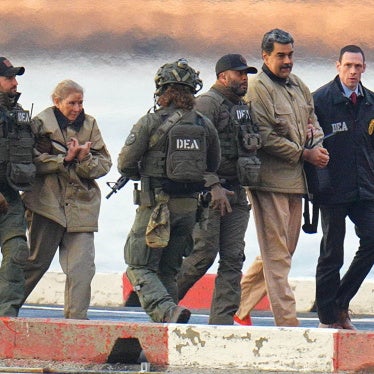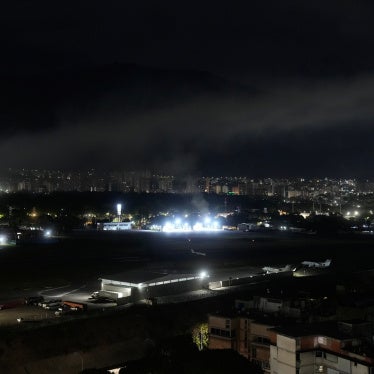Washington, D.C., July 8, 2014
Juan Carlos Pinzón
Defense Minister of Colombia
Bogotá, D.C. - COLOMBIA
Dear Minister Pinzón,
I am writing to express my serious concern over the imminent passage of the military justice system reform bill you submitted to Congress in September 2013. Senate bill number 85 of 2013—which has already passed two of four required Congressional debates—would open the door to unlawful killings known as “false positives” being transferred from civilian prosecutors to the military justice system.[1] Under the bill, the military justice system would also handle other past and possible future human rights crimes by military members—including rape, inhuman treatment and mutilation—in direct contradiction with Colombia’s international law obligations. Furthermore, the bill provides that the military justice system would investigate military members accused of illegal interceptions, illegal arms trafficking, and conspiring with paramilitaries or criminal gangs to commit crimes such as torture, forced disappearances, and drug trafficking, which would be a recipe for impunity.
The bill explicitly assigns to military courts the crimes for which false positive cases are currently pursued by civilian prosecutors. Article 8 of the bill provides that military courts would handle “homicide” and international humanitarian law (IHL) violations committed by military personnel. The thousands of false positive cases under investigation by the Attorney General’s Office are pursued as the crimes of “homicide of protected persons,” “aggravated homicide,” or “homicide.”[2] The Colombian Criminal Code (C.C.) defines “homicide of protected persons” (art. 135 of the C.C.) as an IHL violation, and “aggravated homicide” (art. 104 of the C.C.) and “homicide” (art. 103 of the C.C.) are both offenses contained in the “homicide” chapter of the Criminal Code. Therefore, all three of the crimes for which false positive cases are currently pursued fall into two categories of offenses that the bill would assign to military courts.
Article 98 of the bill provides that the military justice system would “exclusively handle” IHL violations by military personnel, except for a closed list of seven crimes, including “extrajudicial executions” and “sexual violence.” The exemption of “extrajudicial executions” would not ensure that “false positives” remain with civilian prosecutors, because the offense of “extrajudicial executions” is not codified in Colombian law.
Defense lawyers could request the immediate transfer of false positive cases to military courts by arguing that their clients are accused of “homicide of protected persons,” “aggravated homicide,” or “homicide”—all crimes that fall under military jurisdiction according to article 8 of the bill—and not an “extrajudicial execution.”
The bill’s exclusion of “sexual violence” from military jurisdiction would not ensure that cases of rape by military personnel remain in civilian courts. Like the term “extrajudicial executions,” “sexual violence” is not codified in Colombia’s Criminal Code. The crimes for rape in Colombia’s Criminal Code are “violent carnal access in protected persons,” (art. 138 of the C.C.) and “violent carnal access,” (art. 205 of the C.C.) among others.
The military justice system would handle cases of inhuman treatment by the military because this crime is not on the closed list of seven offenses excluded from military jurisdiction in the bill. And cases of mutilation by military members would be investigated by the military justice system because article 9 of the bill provides that military courts would handle “personal injuries.” “Personal injuries” is the chapter of the Colombian Criminal Code that contains the crimes of “injuries,” (art. 111 of the C.C.) injuries causing “deformity,” (art. 113 of the C.C.) and injuries causing “the anatomical or functional loss of an organ or member” (art. 116 of the C.C.).
In October 2013, Colombia’s Constitutional Court struck down on procedural grounds a constitutional amendment that was similar to the bill under consideration, which also made human rights violations subject to military courts. However, the current proposed legislation represents an even broader expansion of military jurisdiction than the constitutional amendment. It assigns additional crimes to the military justice system, such as illegal interceptions, terrorism, arms trafficking, pillaging, and colluding with paramilitaries or criminal gangs (BACRIM), including when the collusion is for the purpose of committing serious crimes like torture, forced disappearances, and drug trafficking. This is because article 8 of the bill provides that military courts would try:
- “Crimes against the protection of information and data.” The protection of information and data is the name of Title VII Bis of Colombia’s Criminal Code, which includes the crimes of “abusive access to an information system,” (art. 269A of the C.C.) “interception of information data,” (art. 269C of the C.C.) and “violation of personal data” (art. 269F of the C.C.).
- “Crimes against public security.” This is the name of Title XII of Colombia’s Criminal Code, which includes the crimes of “terrorism,” (art. 343 of the C.C.) “manufacturing, trafficking, or carrying firearms or munitions,” (art. 365 of the C.C.) “threats” (art. 347 of the C.C.), “training for illegal activities” (including the training of death squads, art. 341 of the C.C.), and “conspiracy to commit a crime” (art. 340 para. 1 of the C.C.)—the standard charge for collaborating with paramilitaries and their successor groups (BACRIM). Furthermore, this title in the Criminal Code includes conspiracy to commit a crime “when the conspiracy is to commit the crimes of genocide, forced disappearance, torture, forced displacement, homicide, terrorism, drug trafficking, extortionate kidnapping, extortion…” (art. 340, para. 2 of the C.C.).
- “Crimes against the civilian population.” This is the name of Title VI of the Colombian Military Penal Code, which includes the crimes of “pillaging” (art. 156 of the C.P.M.) and “devastation” (art. 155 of the C.P.M.). “Devastation” is defined as “someone who in acts of service and without just cause, destroys buildings, temples, monuments or other goods of public utility; or attacks hospitals….”
Military members have been implicated in several of these crimes, including in very recent scandals. For example, this February you announced the removal of the head of army intelligence from his post after Semana magazine revealed that the Attorney General’s Office had raided a location in Bogotá where military intelligence personnel were allegedly carrying out illegal interceptions. In March, the Attorney General’s Office ordered the arrest of retired Colonel Robinson González del Río for allegedly leading a network of active and retired security force members that sold weapons to the Urabeños paramilitary successor group. And as Human Rights Watch, prosecutors and others have documented, sectors of the military colluded extensively with United Self-Defense Forces of Colombia (AUC) paramilitaries as they were committing mass atrocities throughout the country.[3] Taking into account the military justice system’s track record of impunity, sending these crimes to military jurisdiction would significantly diminish any chance of accountability.
The draft legislation actively promotes the transfer of cases from civilian prosecutors to military courts. Article 94 of the bill explicitly states that the “new norms of jurisdiction” contained in the bill would apply to past cases that are already under investigation and have not yet reached the trial stage. As of June 18, the Human Rights Unit of the Attorney General’s Office was investigating 1,907 cases of unlawful killings attributed to state agents—involving nearly 3,400 victims—in which the case had not yet reached trial.[4]
For cases that have reached the trial stage, the rules of jurisdiction outlined in Law 522 of 1999 would apply, according to the bill. The application of Law 522 of 1999 would give greater jurisdiction to the military justice system in comparison to Law 1407 of 2010, which modified the former, and is currently in force. Law 522 of 1999 only excluded from military jurisdiction torture, genocide, and forced disappearances, whereas Law 1407 of 2010 excludes those crimes as well as crimes against humanity, IHL violations and other conduct that breaks the agent’s functional link to service (emphasis added). The application of Law 522 of 1999 could thereby allow for cases of false positives and other abuses currently at trial in civilian courts to be transferred to the military justice system.[5]
Similarly to the current proposed bill, the constitutional reform of the military justice system approved in December 2012 also established that the military justice system would “exclusively handle” all IHL violations, except for an identical list of seven crimes. At the time, Human Rights Watch warned it would lead to false positive cases being transferred from civilian to military courts. The government promised this would not happen. However, during the time the constitutional amendment was in effect (it was struck down in October 2013), at least 48 cases of alleged false positives were transferred from the civilian to military justice system, according to the UN Office of the High Commissioner for Human Rights’ 2013 annual report.[6] For example, in June 2013, as a result of the amendment, the case of Carlos Alfonso Suárez Ortiz, a retired army colonel facing trial for two alleged false positive killings, was transferred to the military justice system.
Along with leading to the transfer of past cases, the bill would also strip the Attorney General’s Office of its authority to verify and investigate unlawful killings military members may commit in the future. This is because unlawful killings are investigated as “homicide,” “aggravated homicide,” or “homicide of protected persons,” all three of which article 8 of the bill assigns to military jurisdiction.
The draft law’s expansion of the military justice system over human rights and IHL violations directly contradicts the repeated rulings of the Constitutional Court of Colombia and the Inter-American Court of Human Rights.[7] In September 2012, for example, the Inter-American Court ruled in the case of Vélez Restrepo and Family v. Colombia that the military justice system “is not the competent system of justice to investigate and, as appropriate, prosecute and punish the authors of human rights violations.”[8]
Proponents of the bill—including Senator Juan Manuel Galán—have erroneously argued that the Constitutional Court’s repeated decisions to exclude IHL violations from military jurisdiction are no longer valid because they were issued before the Colombian government officially recognized the existence of the country’s internal armed conflict in the 2011 Victims Law. According to this argument, the recognition of the internal armed conflict “changes the conditions for applying IHL.” However, in reality, the government’s recognition of the internal armed conflict has no bearing whatsoever on the application of IHL in Colombia. Common Article 3 of the Geneva Conventions, ratified by the Colombian government in 1961, applies automatically once the objective situation of armed conflict exists—irrespective of whether a state recognizes the existence of conflict. Furthermore, it is worth noting that for over a decade, the Constitutional Court of Colombia has recognized the existence of Colombia’s internal armed conflict.
The bill conflicts directly with human rights conditions established by the U.S. Congress to authorize military aid to Colombia. The conditions, enshrined in U.S. law, require that Colombian military personnel credibly alleged to have violated human rights are “subject only to civilian jurisdiction during investigation and prosecution.”
Passage of the bill could also have implications for Colombia with regard to the International Criminal Court (ICC). The Office of the Prosecutor of the ICC is closely monitoring proceedings related to false positives cases, and has reported that the proceedings “have largely failed to focus on the persons who might bear the greatest responsibility for the commission of these crimes.”[9] In 2013, the office reported it is also monitoring the implementation of military justice system reforms and that it is aware of concerns over the “alleged lack of independence and impartiality of the Colombian military justice system and the consequences this could have for the investigation and prosecution of false positive cases.”[10] The ICC has a mandate to open an investigation if Colombia is unwilling or unable genuinely to prosecute war crimes or crimes against humanity. The investigation and prosecution of false positives by the military justice system would undermine the independence and genuineness of proceedings, and could expose Colombia to an investigation by the ICC.
The bill is completely unjustified. The Colombian government has claimed it is necessary to expand the scope of the military justice system because civilian prosecutors have baselessly prosecuted soldiers for legitimately killing guerrillas in combat. However, the government has failed to provide a single example of such unfounded prosecutions, despite multiple requests by Human Rights Watch. In December 2012, you sent Human Rights Watch a letter citing three examples of what you called “the alarming situation of military members convicted for combat killings.”[11] We reviewed the three cases, and all of them are false positives correctly punished by civilian courts.[12]
The record shows that when the military justice system investigates human rights violations by military members, the outcome is virtually always impunity. Not only would this bill undermine victims’ rights, but as I have explained, it would also have serious consequences for Colombia with regard to the ICC and Inter-American human rights system. Taking these reasons into account, I respectfully urge you to withdraw Senate bill number 85 of 2013.
Sincerely,
José Miguel Vivanco
CC: Alfonso Gómez Méndez, Minister of Justice and Law
[1] Text approved in the plenary session of the Senate of the Republic on the 14th and 20th of May 2014 for Senate bill number 85 of 2013 by which the military and police justice systems are restructured, the requirements for holding its posts are established, the Military and Police Prosecutor’s Office is implemented, its investigative body is organized, and provisions are noted about jurisdiction for the transition to the Accusatory Penal System and to guarantee its full effectiveness in the specialized jurisdiction and other provisions are noted, http://servoaspr.imprenta.gov.co:7778/gacetap/gaceta.mostrar_documento?p_tipo=1698&p_numero=85&p_consec=39461 (accessed July 7, 2014).
[2] The Human Rights Unit of the Attorney General’s Office reported that of the cases of alleged unlawful killings attributed to state agents it is investigating, 1,716 (affecting 3,070 victims) are pursued as aggravated homicide, 343 (affecting 629 victims) as the crime of homicide of protected persons, and 19 (affecting 31 victims) as the crime of homicide. Email from Attorney General’s Office official to Human Rights Watch, June 18, 2014.
[3] As of March 2013, statements by mostly paramilitary defendants in the Justice and Peace process had enabled the Justice and Peace unit of the Attorney General’s Office to issue information to other prosecutors so investigations would be opened into 1,023 members of the armed forces. Report provided to Human Rights Watch by the National Prosecutors’ Unit for Justice and Peace, March 2013.
[4] Email from Attorney General’s Office official to Human Rights Watch, June 18, 2014.
[5] As of June 18, 167 cases of alleged unlawful killings attributed to state agents investigated by the Human Rights Unit of the Attorney General’s Office were at the trial stage. Email from Attorney General’s Office official to Human Rights Watch, June 18, 2014.
[6] Annual Report of the UN High Commissioner for Human Rights on the situation of human rights in Colombia, A/HRC/25/19/Add.3, January 24, 2014, para. 51, http://www.hchr.org.co/documentoseinformes/informes/altocomisionado/informe2013EN.pdf (accessed July 5, 2014).
[7] See, for example, Colombian Constitutional Court, Sentence C-358/97; Inter-American Court of Human Rights, Case of Almonacid Arellano et al v. Chile, Judgment of September 26, 2006, Inter-Am.Ct.H.R., Series C. No.154, para. 131; Case of the Rochela Massacre v. Colombia, Judgment of May 11, 2007.
[8] Inter-American Court of Human Rights, Case of Vélez Restrepo and Family v. Colombia, Judgment of September 3, 2012, Inter-Am.Ct.H.R., Series C No. 248, para. 240.
[9] Office of the Prosecutor of the ICC, Situation in Colombia: Interim Report, November 2012, para. 220, http://www.icc-cpi.int/NR/rdonlyres/3D3055BD-16E2-4C83-BA85-35BCFD2A7922/285102/OTPCOLOMBIAPublicInterimReportNovember2012.pdf (accessed July 5, 2014).
[10] Office of the Prosecutor of the ICC, Report on Preliminary Examination Activities 2013, November 2013, para. 138, http://www.icc-cpi.int/en_menus/icc/press%20and%20media/press%20releases/Documents/OTP%20Preliminary%20Examinations/OTP%20-%20Report%20%20Preliminary%20Examination%20Activities%202013.PDF (accessed July 5, 2014).
[11] Letter from Juan Carlos Pinzón, Defense Minister of Colombia, to José Miguel Vivanco, Human Rights Watch, December 3, 2012. Available at http://www.scribd.com/doc/115449869/Este-es-el-documento-que-envio-el-Ministro-Pinzon (accessed July 5, 2014).
[12] Criminal Cassation Chamber of the Supreme Court of Colombia, Case Number 35230, Decision of May 4, 2011; Criminal Cassation Chamber of the Supreme Court of Colombia, Case Number 35889, Decision of September 14, 2011; Superior Tribunal of the Judicial District of Valledupar, Case reference # 20016001074200880244.








